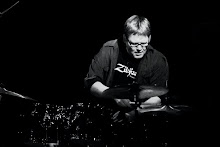How many of us have had a similar experience to Homer (from 0:43 - 0:53)?
….In the late 80s, I auditioned for the Jazz program at the Banff School for the Arts. I wasn't very good, was supremely unconfident in my musical abilities and myself in general, and I really didn't know that much about Jazz or how to play it. Nonetheless, I played for Dave Holland in Montreal and he was kind enough to let me attend. I am still thankful for that. The drum prof in the program was a very well known player at the time, with MASSIVE amounts of technique, and I was super intimidated. Despite this, I learned a lot from him, but at the same time, he was very distant from the students. He also never let us forget that he was the voice of authority, and that we really didn't know anything. ( And thinking back on it, he was absolutely correct!) When his time at the school was up (it was a month long program, but most of the faculty were only there for part of the time) he said something to the effect of, "When I got here, you all really sucked, but now you suck a little less, and that's because of me!"
That was my first experience with a gatekeeper.
I'm not actually putting down the gatekeepers, as I think they have important roles to play. The gatekeepers keep us humble, they help us to gain strength and resilience, and they help us to learn to believe in ourselves.
That said, for a young, mediocre drummer who was scared of his own shadow, it wasn't much fun! I desperately wanted this person to like me, to like my playing, to acknowledge me as one of "the cats". As someone who was the product of a broken marriage and who's father lived in a different city than me, I'm sure there were some "daddy issues" in there as well. So, in other words, I wanted this person who had just met me, didn't like my playing, probably thought I hadn't done any work to learn the drums or the music it was involved in; I wanted him to sooth my bruised, fragile ego, and self-image problems. That was an impossible task, believe me!
But here's the thing. As soon as I stopped looking at others for approval, I was better able to follow my own path and really get to work. A great saying I heard in therapy circles is, "What you think of me is none of my business"! As long as we care about what gatekeepers think, we will always be in our own way. A lot of the "clubs" these people run that won't have you as a member have nothing to do with music. They will reject you because of the place you come from, your gender, your sexual preferences and identity, even your skin hue.(And please note I'm not accusing anyone in particular of this.) Even when you're not barred from entry by these things it might be what gigs you play, what grip you use, the amount of flashy technique you do or don't have etc…..
So, by all means, learn everything you can from everyone. Just realize you're not going to be able to hang with all of them, and that's okay. From every report I've heard, Tony Williams was the ultimate gatekeeper. Mr. Williams was and will continue to be a beacon of everything I love in drums and music, but we were never going to be bowling buddies or anything. :) I would also gently advise people to try and leave one's ego out of interactions with other musicians when you meet them. Case in point, I've heard the great Lewis Nash live a few times in recent years, and I've told him how much I enjoy his wonderful playing. Since I wasn't taking a lesson, or playing a gig with him, it didn't matter if I told him whether I played drums, kazoo, or the radio! Me shoehorning that into the conversation would just be my ego, and therefore useless, so I didn't mention it.
So, as the waffle people say, Lego your ego!!!
Have fun and be good to yourselves.

I love this so much, Ted. I see so many similarities in our experiences. You took a plunge that I was scared to take, and you took advantage of every opportunity, whereas it took me a longer to get to the places you refer to.I didn't realize the role gatekeepers played in my development until a decade or more after I graduated, and even then I resented it until I could see the bigger picture. I love what you do and who you are, Ted. Carry on :-)
ReplyDelete